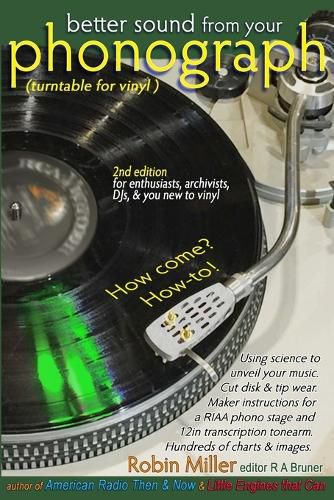Readings Newsletter
Become a Readings Member to make your shopping experience even easier.
Sign in or sign up for free!
You’re not far away from qualifying for FREE standard shipping within Australia
You’ve qualified for FREE standard shipping within Australia
The cart is loading…






This title is printed to order. This book may have been self-published. If so, we cannot guarantee the quality of the content. In the main most books will have gone through the editing process however some may not. We therefore suggest that you be aware of this before ordering this book. If in doubt check either the author or publisher’s details as we are unable to accept any returns unless they are faulty. Please contact us if you have any questions.
2nd Edition (the 1st had 4 stars) of "Better Sound from your Phonograph," a Master Class Textbook for your turntable (record player). The authoritative reference on the science of "vinyl." The "How come?" shared by every make & model. From the most critical part - the stylus. Its "profile" (shape) determines vinyl's distortion, whether reducing it for "cleanest" sound, or preferring its added coloration. Then "How to" achieve proper alignment, optimal resonance, cartridge loading for best timbre (tone color), channel balance for best stereo "soundstage" (imaging) and artifact cancellation in mono, and skating compensation for lowest wear of both stylus and your record collection. Hundreds of illustrations of the mechanics of grooved media distortion, stylus micro-photos for selecting replacements, and charts for best performance. "How to" make your own RIAA preamp, or a low-distortion transcription-length tonearm. In short, how to enjoy your music and play 140yr of recorded history "better." Vinyl's best quality is baked in the groove - it's up to users and installers to render it. With help of this totally rewritten and expanded 2nd edition. How come records sound better than over-processed digital? It gaslights shoppers to mistake louder as better, when you could simply turn up the volume, and retain natural dynamics and harmonic relationships (tone color) that have been lost. Processing artifacts are irritating, causing complaints of "It's too loud!" - and not high fidelity! Yet since the 1950s, well-recorded AND well played back analog vinyl still qualifies as high-fidelity.
$9.00 standard shipping within Australia
FREE standard shipping within Australia for orders over $100.00
Express & International shipping calculated at checkout
This title is printed to order. This book may have been self-published. If so, we cannot guarantee the quality of the content. In the main most books will have gone through the editing process however some may not. We therefore suggest that you be aware of this before ordering this book. If in doubt check either the author or publisher’s details as we are unable to accept any returns unless they are faulty. Please contact us if you have any questions.
2nd Edition (the 1st had 4 stars) of "Better Sound from your Phonograph," a Master Class Textbook for your turntable (record player). The authoritative reference on the science of "vinyl." The "How come?" shared by every make & model. From the most critical part - the stylus. Its "profile" (shape) determines vinyl's distortion, whether reducing it for "cleanest" sound, or preferring its added coloration. Then "How to" achieve proper alignment, optimal resonance, cartridge loading for best timbre (tone color), channel balance for best stereo "soundstage" (imaging) and artifact cancellation in mono, and skating compensation for lowest wear of both stylus and your record collection. Hundreds of illustrations of the mechanics of grooved media distortion, stylus micro-photos for selecting replacements, and charts for best performance. "How to" make your own RIAA preamp, or a low-distortion transcription-length tonearm. In short, how to enjoy your music and play 140yr of recorded history "better." Vinyl's best quality is baked in the groove - it's up to users and installers to render it. With help of this totally rewritten and expanded 2nd edition. How come records sound better than over-processed digital? It gaslights shoppers to mistake louder as better, when you could simply turn up the volume, and retain natural dynamics and harmonic relationships (tone color) that have been lost. Processing artifacts are irritating, causing complaints of "It's too loud!" - and not high fidelity! Yet since the 1950s, well-recorded AND well played back analog vinyl still qualifies as high-fidelity.